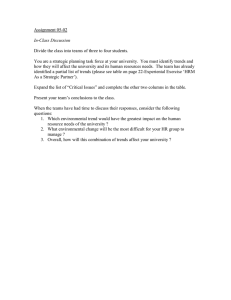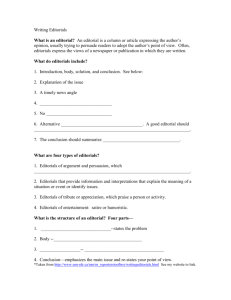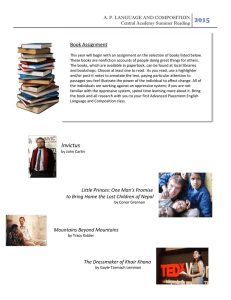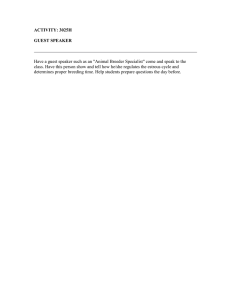Journalism 425: Editorial and Critical Writing
advertisement
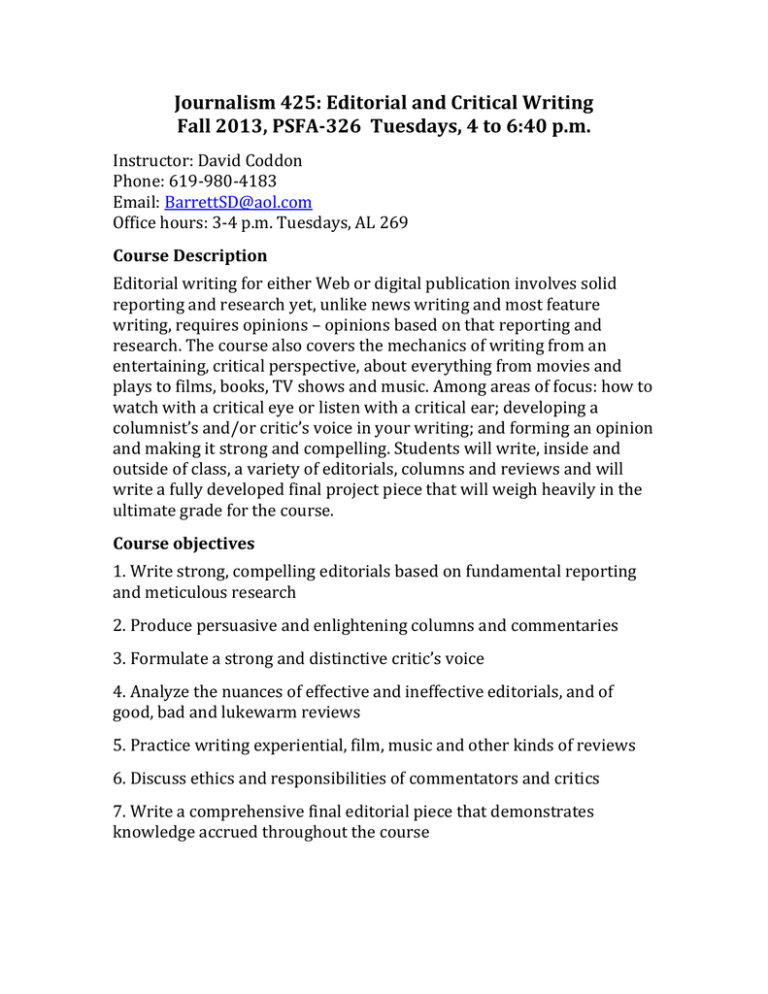
Journalism 425: Editorial and Critical Writing Fall 2013, PSFA-326 Tuesdays, 4 to 6:40 p.m. Instructor: David Coddon Phone: 619-980-4183 Email: BarrettSD@aol.com Office hours: 3-4 p.m. Tuesdays, AL 269 Course Description Editorial writing for either Web or digital publication involves solid reporting and research yet, unlike news writing and most feature writing, requires opinions – opinions based on that reporting and research. The course also covers the mechanics of writing from an entertaining, critical perspective, about everything from movies and plays to films, books, TV shows and music. Among areas of focus: how to watch with a critical eye or listen with a critical ear; developing a columnist’s and/or critic’s voice in your writing; and forming an opinion and making it strong and compelling. Students will write, inside and outside of class, a variety of editorials, columns and reviews and will write a fully developed final project piece that will weigh heavily in the ultimate grade for the course. Course objectives 1. Write strong, compelling editorials based on fundamental reporting and meticulous research 2. Produce persuasive and enlightening columns and commentaries 3. Formulate a strong and distinctive critic’s voice 4. Analyze the nuances of effective and ineffective editorials, and of good, bad and lukewarm reviews 5. Practice writing experiential, film, music and other kinds of reviews 6. Discuss ethics and responsibilities of commentators and critics 7. Write a comprehensive final editorial piece that demonstrates knowledge accrued throughout the course Grading criteria The grade for the course will be based on your final class project (30 percent) as well as on class attendance and participation (10 percent) and one oral presentation (10 percent). There will be five take-home writing assignments during the semester, each of which will be worth 10 percent of the remaining 50 percent of your final grade. Attendance Regular attendance is expected. Roll will be called at the beginning of each class. If you must miss a class, find out what you missed from a classmate. If you have additional questions about that day’s material, contact me via email. Class Participation Class participation and discussion are two of the most important elements of this class. In order to do so, you MUST READ AND PREPARE YOUR ASSIGNMENTS IN ADVANCE OF THE CLASS. Students will participate in many discussions, one-on-one and as a class. Class Etiquette No cell phones, pagers, headphones or iPods may be in use during class time. You are expected to arrive on time to class each day and to remain for the duration of the period. Please give your full attention to the instructor, to guests and to your fellow students at all times. Show them the respect that you expect for yourself. Your participation in class discussions is strongly encouraged. Required Course Texts/Materials Fink, Conrad C., “Writing Opinion for Impact,” 2nd Edition Access to Associated Press stylebook A notebook that can be used as a journal for writing Written Work All material written outside of class is required to be word processed (New Roman type, 12 pt., double spaced) and stapled. Plagiarism/Academic Integrity Students are expected to be honest and ethical at all times. There is a zero-tolerance policy regarding cheating in this class. Cheating includes plagiarism. Examples of plagiarism: 1. Submitting work, either in part or in whole, completed by another. 2. Omitting quotation marks when quoting directly from another, whether it be a paragraph, sentence or part thereof. 3. Close and lengthy paraphrasing of the writing or work of another, with or without acknowledgement. 4. Submitting papers purchased from research companies (or downloaded) as one’s own work. Students caught cheating or plagiarizing on an exam, quiz or class assignment will receive a failing grade on that project and possibly as a final course grade. The instructor also reserves the right to report that student to the chair of the Department of Journalism and Media Studies. COURSE OUTLINE, DEADLINES, READINGS AND ASSIGNMENTS This schedule below, including classroom agendas, assignments and guest speakers, is subject to change. Week 1 (Aug. 27) Agenda: Introductions; orientation to course, text, requirements; discussion of fundamentals of editorials, columns and reviews, perusal of samples of each; in-class writing exercise Homework: Read pp. 65-94 in text (“Writing Newspaper Editorials”); bring sample of an editorial of your choice to class Week 2 (Sept. 3) Agenda: Critique of writing exercises; discussion of editorials brought to class; dissecting an editorial page in print and on the Web; in-class writing assignment Homework: Read pp. 23-58 in text (“Identifying Issues for Comment,” “Reporting and Researching Your Opinions”) Week 3 (Sept. 10) Agenda: Guest speaker working in editorial writing or cartooning (TBA); discussion of opinion and ethics and legalities; class critiques of pro and con editorials: Did the writer make his/her point? Homework: Assignment #1: Write an issue-oriented editorial; read pp. 255-276 in text (“Specialty Columns and Comment”) Week 4 (Sept. 17) Agenda: Discussion of commentaries – differences between these and editorials; in-class writing exercise Homework: Read pp. 281-296 in text (“Commentary for Cyberspace and Broadcast”) Week 5 (Sept. 24) Agenda: Guest speaker editorial writer James Gogek (tentative); discussion of emotion vs. reason; in-class exercise: arguing a case or point Homework: Read pp. 125-152 in text (“Commentary That Hits Hard”) Week 6 (Oct. 1) Topic: Lecture, discussion on column-writing; in-class exercise Homework: Read pp. 159-181 in text (“Amusing, Entertaining or Making ‘Em Cry”); Assignment #2: Write a column or commentary Week 7 (Oct. 8) Agenda: Continue discussion of columns; survey on how visuals, including photographs and videos, make commentary or column points; guest speaker: Reader columnist Barbarella Fokos Homework: Read pp. 221-238 in text (“You and Arts Commentary,” part 1); bring in a review of some kind that interests you Week 8 (Oct. 15) Agenda: Introduction to criticism; in-class review exercise; handout on final course assignment, parameters Homework: Read pp. 239-246 in text (“You and Arts Commentary,” part 2) Week 9 (Oct. 22) Agenda: Guest speaker Jeff Smith, theater critic for the Reader; discussion of reviewing points, techniques, parameters for oral presentations Homework: Ungraded reviewing assignment (TBA) Week 10 (Oct. 29) Agenda: In-class screening of short film Homework: Assignment #3: Write review of film Week 11 (Nov. 5) Agenda: Critiquing live material, including musical performances; guest speaker George Varga, pop music critic for UT San Diego Homework: TBA Week 12 (Nov. 12) Agenda: Class will meet at a movie theater to review press screening of upcoming movie (details TK; this also could move to another week, depending on the film chosen) Homework: Assignment #4: Write review of the film screened for us Week 13 (Nov. 19) Agenda: Oral presentations; reviewing as experiential exercise: dining out, public art, leisure, etc. Homework: Assignment #5: Experiential review TBA Week 14 (Nov. 26) Agenda: Visual arts critic Robert Pincus visits; class survey on final project ideas, progress; discussion of opinion writing expressly for the Web, including blogs Homework: Read pp. 299-316 in text (“On Campus Today: How it’s Done”) Week 15 (Dec. 3) Agenda: Workshopping devoted to final course projects Homework: Finish your final projects Week 16 (Dec. 10) Agenda: Final class projects due; this will be an open agenda for lastminute business, discussion, et. al.
